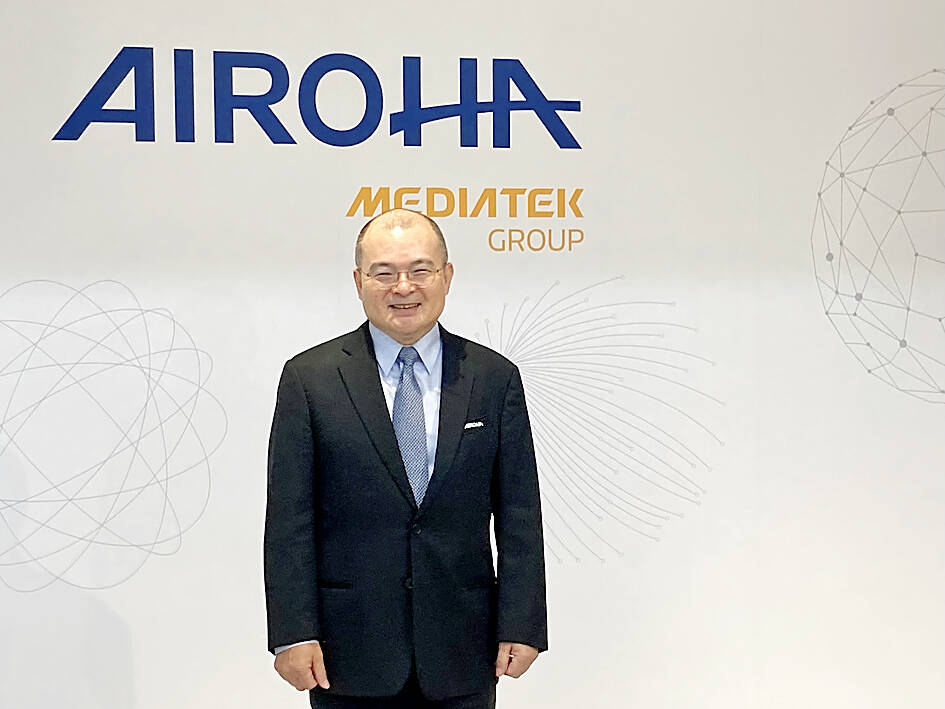MediaTek Inc (聯發科) and its subsidiary Airoha Technology Corp (達發科技) on Monday said they are jointly developing a new artificial intelligence (AI) fiber gateway platform to enhance telecoms’ network performance by 30 percent.
The two companies made the announcement before the Network X show in Paris, which is being held from Tuesday to today.
The platform would be customizable for telecoms, they said.

Photo: Lisa Wang, Taipei Times
The gateway plaftorm could seamlessly fuse MediaTek’s Filogic 680 Wi-Fi 7 with Airoha’s AN7581, enabling cutting-edge AI computing capabilities, they said.
MediaTek, the world’s biggest mobile phone chip supplier, owns about a 66 percent stake in Airoha.
The platform supports major software frameworks including prplOS, RDK-B and OpenWrt, and uses AI-driven autonomous learning to analyze and optimize network traffic, and manage tasks, it said.
By embedding advanced data analytics engines into the AI gateway, the platform enables carrier-grade edge AI services, the two companies said.
Telecoms can use AI for intelligent traffic classification and real-time optimization, achieving more than 30 percent improvement in user network experiences, they said.
The gateway performs automated root-cause analysis of network issues right at the endpoint, slashing mean time to recovery by 40 percent, they said.
Airoha said its fiber broadband networking chips, combined MediaTek’s Wi-Fi chips, have been adopted by Europe’s major telecoms, helping the subsidiary build a strong foothold in the continent and expand its reach to the UK, Spain and Italy.
Fixed networking chips — fiber broadband and ethernet — were one of the biggest revenue sources for Airoha in the second quarter, making up about 40 percent to 45 percent of total. Wireless communication chips — Bluetooth audio chips and satellite positioning chips — were the biggest revenue contributor during that quarter, accounting for 45 percent to 50 percent, it said.

Nvidia Corp chief executive officer Jensen Huang (黃仁勳) on Monday introduced the company’s latest supercomputer platform, featuring six new chips made by Taiwan Semiconductor Manufacturing Co (TSMC, 台積電), saying that it is now “in full production.” “If Vera Rubin is going to be in time for this year, it must be in production by now, and so, today I can tell you that Vera Rubin is in full production,” Huang said during his keynote speech at CES in Las Vegas. The rollout of six concurrent chips for Vera Rubin — the company’s next-generation artificial intelligence (AI) computing platform — marks a strategic

REVENUE PERFORMANCE: Cloud and network products, and electronic components saw strong increases, while smart consumer electronics and computing products fell Hon Hai Precision Industry Co (鴻海精密) yesterday posted 26.51 percent quarterly growth in revenue for last quarter to NT$2.6 trillion (US$82.44 billion), the strongest on record for the period and above expectations, but the company forecast a slight revenue dip this quarter due to seasonal factors. On an annual basis, revenue last quarter grew 22.07 percent, the company said. Analysts on average estimated about NT$2.4 trillion increase. Hon Hai, which assembles servers for Nvidia Corp and iPhones for Apple Inc, is expanding its capacity in the US, adding artificial intelligence (AI) server production in Wisconsin and Texas, where it operates established campuses. This

Garment maker Makalot Industrial Co (聚陽) yesterday reported lower-than-expected fourth-quarter revenue of NT$7.93 billion (US$251.44 million), down 9.48 percent from NT$8.76 billion a year earlier. On a quarterly basis, revenue fell 10.83 percent from NT$8.89 billion, company data showed. The figure was also lower than market expectations of NT$8.05 billion, according to data compiled by Yuanta Securities Investment and Consulting Co (元大投顧), which had projected NT$8.22 billion. Makalot’s revenue this quarter would likely increase by a mid-teens percentage as the industry is entering its high season, Yuanta said. Overall, Makalot’s revenue last year totaled NT$34.43 billion, down 3.08 percent from its record NT$35.52

PRECEDENTED TIMES: In news that surely does not shock, AI and tech exports drove a banner for exports last year as Taiwan’s economic growth experienced a flood tide Taiwan’s exports delivered a blockbuster finish to last year with last month’s shipments rising at the second-highest pace on record as demand for artificial intelligence (AI) hardware and advanced computing remained strong, the Ministry of Finance said yesterday. Exports surged 43.4 percent from a year earlier to US$62.48 billion last month, extending growth to 26 consecutive months. Imports climbed 14.9 percent to US$43.04 billion, the second-highest monthly level historically, resulting in a trade surplus of US$19.43 billion — more than double that of the year before. Department of Statistics Director-General Beatrice Tsai (蔡美娜) described the performance as “surprisingly outstanding,” forecasting export growth